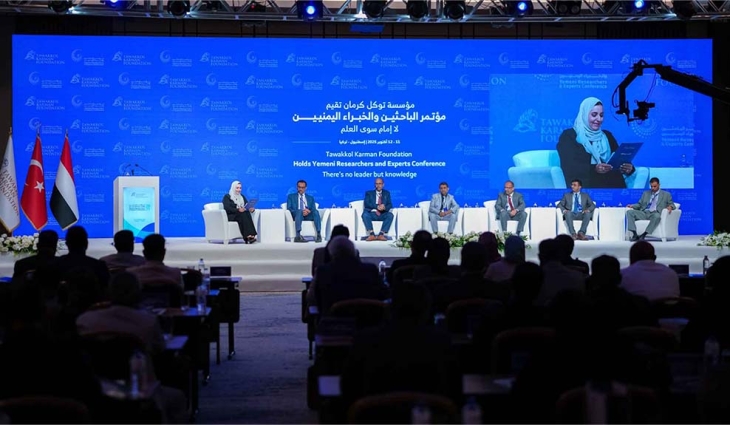Istanbul — Tawakkol Karman Foundation inaugurated today, Saturday, the Yemeni Researchers and Experts Conference in Istanbul, featuring more than 40 research papers presented by Yemeni academics and scholars from within Yemen and over 15 countries worldwide.
The event brought together over 200 participants, including development professionals and those engaged with Yemeni affairs, to discuss the major challenges and opportunities for development in Yemen.
The two-day conference, held on October 11–12, explores a range of themes — education, health, economy, energy, identity, and environment — as part of its mission to shape a comprehensive vision for Yemen’s development.
In her opening address, Tawakkol Karman, Nobel Peace Prize laureate and Chair of Tawakkol Karman Foundation, expressed her pride in meeting some of Yemen’s brightest minds from across the globe, describing the conference as “a gathering of thought, knowledge, and hope for Yemen.” She affirmed, “Nations do not die, peoples do not vanish, and Yemen will rise from the rubble and heal its wounds.”
Karman emphasized that Yemen has the talent and capacity to rebuild its state and shape its future free from external interference, noting that “for an entire decade, politics and war have dominated Yemen’s landscape, while crucial issues of economy, development, education, and health have been pushed aside.”


She added, “Neglecting these issues does not restore the state — it drives it further away. The state is not a mere political construct; it is built upon services — salaries, education, healthcare, and justice.”
Karman strongly criticized both the internationally recognized Yemeni government and the de facto authorities for failing to fulfill their responsibilities toward citizens, pointing out that “the only two sectors thriving in Yemen today are the war economy and political corruption.”
She declared, “The Yemeni people have grown weary of your corruption and tyranny. It is time for them to reclaim their destiny and rise from the ruins.”
Karman reaffirmed that Yemen is neither weak nor dependent on others, stressing that the country possesses abundant human and natural resources that qualify it to stand among the leading nations of the region. She underscored that “the Yemeni individual is the true, priceless wealth of the nation.”
She called for rebuilding the state on the foundations of justice, partnership, and national reconciliation, asserting that “there can be no salvation for Yemen without education that enlightens minds, healthcare that safeguards human dignity, and a productive economy that breaks the cycle of hunger and dependency.”
Karman also warned against marginalizing intellect and undervaluing knowledge, saying that such neglect “paved the way for sectarian and extremist groups.” She added, “Knowledge creates free individuals and gives societies immunity against ignorance, superstition, and the destructive agendas that have torn our homelands apart.”
Turning to regional issues, Karman welcomed the recently announced agreement to end the war in Gaza, describing it as “a first step toward halting the genocide.” She stressed that “a just peace will only be achieved when the occupation ends and the Palestinian people regain their national rights.”
She concluded, “The Israeli occupation will not endure — nations never perish, no matter the sacrifices they make.”
On its first day, the conference features 22 research papers presented by 26 Yemeni academics and researchers, addressing diverse topics such as higher education in Yemen, the future of political life, public health and medical infrastructure, and pathways out of economic and service crises.
Tawakkol Karman Foundation is an international non-governmental organization founded by Nobel Peace Prize laureate Tawakkol Abdel-Salam Karman. The Foundation works to advance peace and sustainable development by empowering communities in the fields of education, health, infrastructure, and economy, and by promoting the role of women and youth in leadership and public life. It upholds democracy, good governance, and human rights as core pillars for achieving lasting peace and inclusive development.

